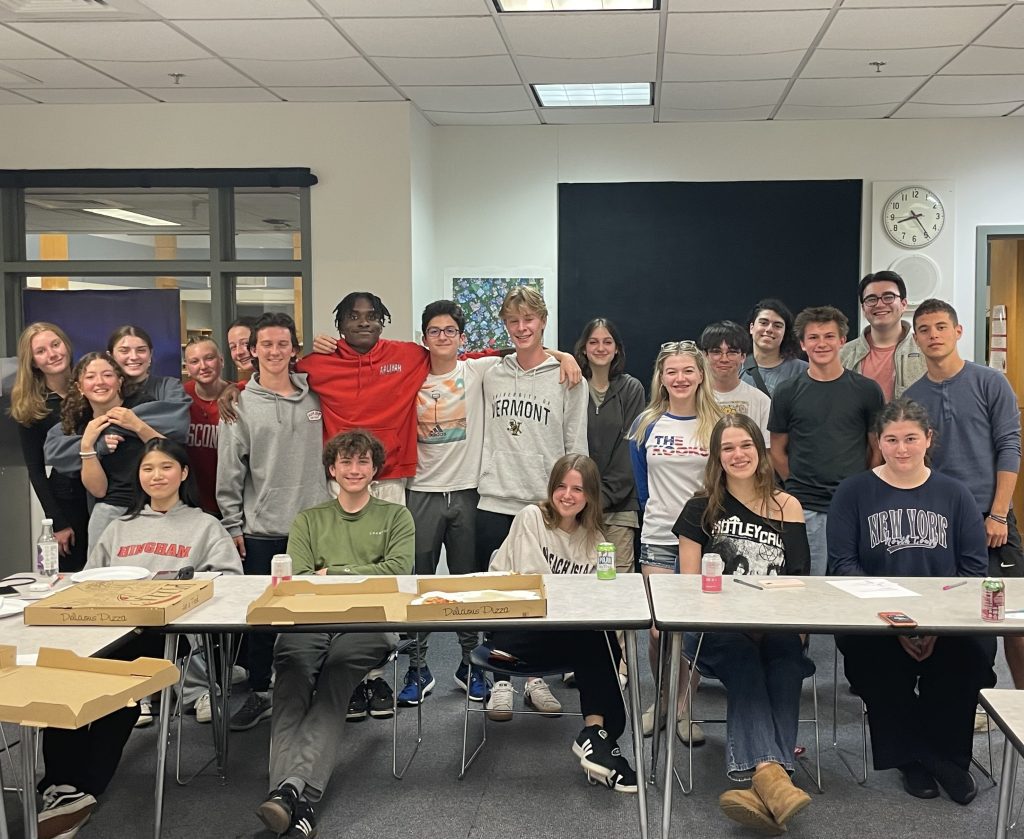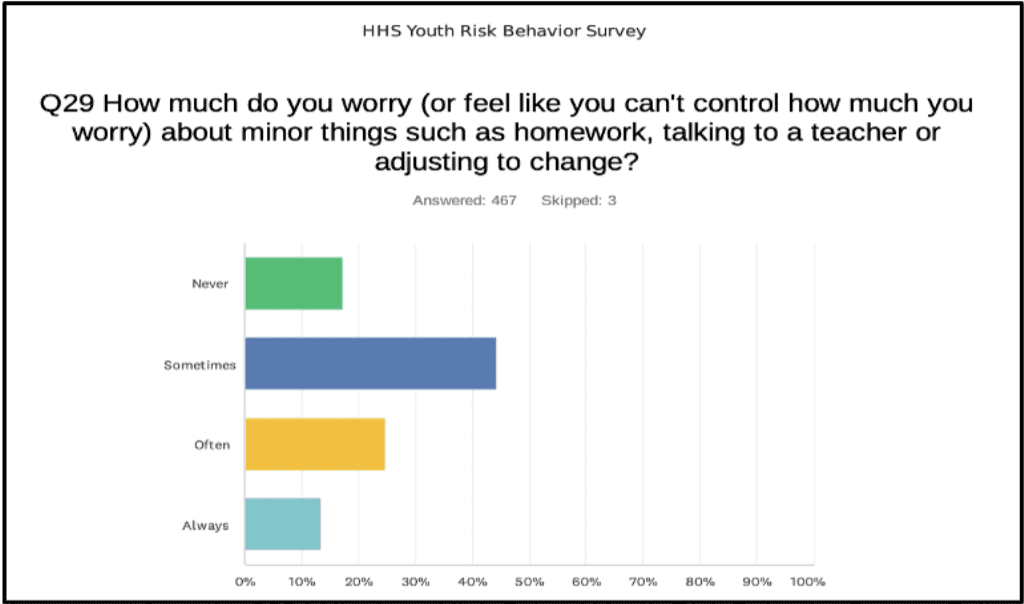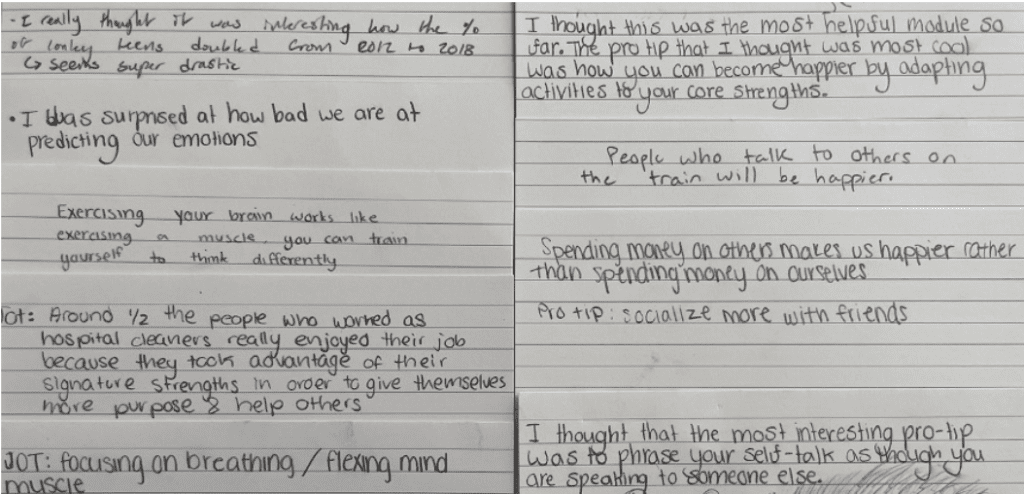
June 3, 2024 By Vanessa Webb, HPS Wellness Committee Member
It’s not easy being a teenager. And it seems to be getting harder. Teens are navigating more challenges than ever: the relentless pull of social media and smartphones, social disconnection heightened by the pandemic, intense focus on academics and college admissions, over-booked schedules, and not enough sleep.
Many teens are struggling with mental health. According to the CDC, last year 37% of teens reported experiencing mental health issues. We are seeing this first-hand in our community and our families: the responses from this year’s annual Hingham High School Youth Risk Behavior Survey (administered every spring to 9th and 11th graders) echo the national trend of rising anxiety, depression, and isolation. In this year’s survey, Hingham students reported that:
- 80% worry (or can’t control how much they worry) about minor things
- 55% avoid going places or trying new things because of anxiety
- 45% feel isolated from others some of or all the time
- 10% felt so sad/hopeless for two or more weeks that they stopped doing their regular
activities - 30% are getting six or less hours of sleep a night

Full results can be found at http://hinghamhealth.weebly.com/uploads/9/1/2/3/9123187/hhs_yrbs_summary_data___1_.pdf
It’s clear our teens need support. All teens should have strategies and tools to help them navigate the stress, difficult emotions, and negative thoughts that are a normal part of life – but if unsupported, can lead to mental health issues. They also should have information about actions they can take to feel happier. We need to help our teens learn and build skills for well- being. The question is, how do we do this?
Dr. Laurie Santos is offering an answer. A few years ago, Dr. Santos, head of Yale’s Psychology College, noticed that many of her students were unhappy. She was seeing students who were increasingly anxious and depressed, overwhelmed by stress, exhausted from trying to keep up with each other, and feeling isolated.

Dr. Santos decided to create a new class focused on mental well-being, explaining how the mind works when it comes to happiness and offering students science-based strategies to reduce stress and feel happier. The class distilled three decades of research into practical tips and evidence-based tools students could apply to their everyday lives. She called it “Psychology and the Good Life.”
Dr. Santos expected thirty or so students to register for the new class. She was shocked to see a thousand students in the lecture hall on the first day of class. Students were clearly looking for ways to manage their stress and feel happier. Psychology and the Good Life quickly became the most popular class in Yale’s 300-year history.
Based on the success of the class, “The Science of Well-Being,” a free online version of the class was introduced on the Coursera learning platform. Over 4 million people have taken the course worldwide.
Amidst the mounting teen mental health crisis, parents and educators soon flooded Dr. Santos with requests for a teen version. In early 2023, Yale released the “Science of Well-Being for Teens” with high schoolers in mind.
Yale’s Science of Well-Being for Teens follows the original but with topics and examples geared toward the high school experience, such as social comparison, grades and college admissions, phones and social media, self-criticism and doubt, and not enough down time or sleep.

The course is made up of six one-hour modules, consisting of short videos of Dr. Santos teaching from a classroom at Yale. Topics covered include common misconceptions about happiness (including how happiness does not mean the absence of discomfort and difficult emotions), the three big things that tend to get in the way and what we can do about them, the behaviors that promote happiness, and how to work with difficult thoughts and emotions, including stress.
The Science of Well-Being for Teens is a great resource for helping high schoolers learn skills for well-being. It is current, relevant, engaging, reputable, free, and proven. The challenge now is finding effective ways to share the course with local teens.
This Spring, Hingham residents Vanessa Webb and Kevin Quilty put the wheels in motion, partnering with their fellow Hingham Public Schools Wellness Committee members. Over eight weeks, between March and May, 20 Hingham High School students completed a pilot of the Yale course. The students took the course online and met on Wednesday nights to talk about what they had learned and to try some of the “psych pro-tips” from the course, including writing gratitude letters, doing a “fun audit,” and practicing stress-busting breathing techniques.
The students felt the information was delivered in a teen-friendly way – not preachy or cringe- inducing, but science-based, with plenty of pop culture references and humor mixed in.
Given how busy high schoolers are, it wasn’t a given that they would show up each week or complete the course on top of their other commitments. They did. Attendance each week exceeded expectations and all 20 students completed the course.
Incentives were key to encouraging students to sign up: snacks and “question of the week” mystery prizes at the sessions, a $50 gift card to a choice of Hingham restaurants and Yale Course Certificate upon completing the course, and the opportunity to add a unique experience to their high school resume. However, once the pilot got started, the course, conversations, and camaraderie kept the students engaged and coming back.
The students found the Yale course interesting, relatable, and manageable. Each week, as they completed a module, they brought in “just one thing,” or JOTS, that they found especially interesting or surprising. These JOTS served as great conversation starters, letting the students drive the discussions based on what interested them the most. The students also chose a pro-tip to try out on their own each week, and shared how it went with the group, such as turning off notifications on their phone, carving out 15 minutes of time to themselves each night to do nothing, and doing small acts of kindness.
The Wednesday night sessions were full of lively conversation and commiseration about the stresses and joys of life as a high schooler, grounded in the new things the students were learning. The forum gave them a safe, relaxed place to talk openly about their challenges and, importantly, to realize they are not alone.

The students’ response to the pilot class was incredibly positive. They all said they took away helpful strategies and tools, benefited from being able to relate to their peers, and would personally recommend the class to their friends (a high bar!). Some of what the students had to say…
“The strategies are already helping me manage stress and find happiness in my life.”
“We all experience stressful things, but especially as high schoolers, we are facing anxiety 24/7. This course helps show helpful and effective ways to focus on the joys of life rather than this stress.”
“It made me feel less alone in my problems and normalized my feelings.”
“As a senior a lot of my classes feel pointless, but this one does not. I have learned so many skills that I will take with me for the rest of my life.”
“It gave me lots of insight into my own behavior, what is driving it and how to change habits I don’ like.”
“This class can directly help with a high schooler’s life; it definitely influenced the way I go about mine.”
“Even people I thought I was different from are going through the same thing as me.”
“This class gave me concrete, specific tools to improve my happiness”
These are powerful and encouraging statements, confirming the potential of this course to positively impact teens’ mental health and well-being, helping them build skills they can use in high school and beyond.
Feedback from the pilot group’s parents was also very positive – all parents who responded to the survey said they felt their teen benefited from the class. Parents were engaged throughout the pilot with a weekly email that highlighted the key topics and tips the students learned about that week. A few parents took the Yale course alongside their student.
Given the heartening responses from the pilot students and parents, the HPS Wellness Committee and Hingham High School are thrilled to continue the Science of Well-Being pilot next school year. HHS will offer it as an after-school class again in the Fall and Spring, while concurrently working to incorporate the course into the Program of Studies for an in-school offering in the 2025/26 school year. The Wellness Committee is also exploring additional avenues for promoting and making the course available to as many Hingham teens as possible.
A big thank you goes to the HHS pilot students who stepped up and gave their time and energy to get this program off the ground and share their feedback and ideas – their insights, thoughtfulness, and consideration for each other were truly inspiring.
Dr. Santos’ team at Yale also went above and beyond, providing resources and assistance that helped make the pilot possible.
Anyone who is interested in taking the Science of Well-Being for Teens course online can find it here and is encouraged to do so!
https://www.coursera.org/learn/the-science-of-well-being-for-teens
If you’d like to learn more about Yale’s Science of Well-Being for Teens course or the pilot program at HHS or you are interested in supporting the program, please contact Vanessa Webb at vrosewebb@yahoo.com.

